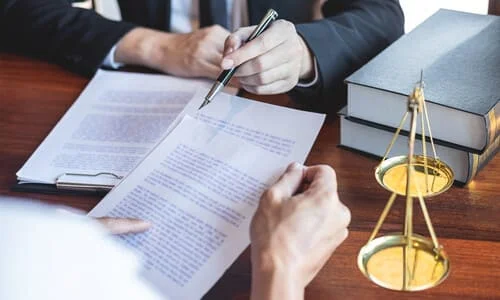 If you or a loved one has been injured in an accident due to someone else’s negligence or intentional wrongdoing, you may be left wondering how you will be able to deal with the fallout.
If you or a loved one has been injured in an accident due to someone else’s negligence or intentional wrongdoing, you may be left wondering how you will be able to deal with the fallout.
You likely have medical bills piling up, and you may not even be able to work. You may find even the simplest tasks infinitely more difficult.
That’s enough to leave anyone feeling worried and stressed when thinking about their future.
If you find yourself in this situation, know that you are not alone. You have many options for moving forward.
The compassionate attorneys at Singh Ahluwalia Attorneys at Law are here to help you decide which path to take during this difficult time. If your injury was a result of someone else’s wrongful actions, you may be entitled to seek compensation from them for your damages.
We would love to hear your story and help you devise a legal plan that will give you the best chance at recovering the compensation you deserve. Our sole goal is to help you recover from your injuries and move on with your life.
If you are ready to begin exploring your legal options, contact one of our experienced personal injury attorneys at Singh Ahluwalia Attorneys at Law.
When you schedule your free, no-obligation consultation, we will listen to the specifics of your case and get started fighting for you. We want to ensure that you have the best chance at receiving the compensation you deserve.
To schedule your consultation, please call us at (559) 878-4958 or fill out our online contact form.
Types of Personal Injury Damages
If you have been involved in any accident, from a car accident to slip and fall accident, you may be able to file a liability claim against the responsible party in order to recover compensation for your losses, called damages.
There are generally three categories that personal injury damages can fall into, and the amount of compensation you will be able to recover is determined by the particular facts and circumstances of your case.
An experienced California personal injury attorney will be able to work with you and calculate the full value of the damages you have suffered, past and future.
The three types of damages are as follows:
Economic Damages
Economic damages address the financial loss that a victim of an accident faces. This category can encompass many situations, from any out-of-pocket expenses to medical bills to vehicle repairs and more.
Economic damages can also include any other bills that you have accumulated as a result of the accident.
Some examples of economic damages can include:
Medical Expenses
Your medical expenses can cover a broad range of things, both past and future — anything from hospital bills and doctor visits to prescription costs and physical therapy.
It can also apply to the cost of medical supplies and any necessary medical equipment, as well as money used to hire in-home healthcare workers.
Lost Income and Benefits
If you have not been able to work as a result of your accident, you may be entitled to reimbursement for your lost income. This income can apply to your wages, salary, or self-employment earnings.
It can also include the value of your benefits, or any bonuses or commission that you may have otherwise earned. Basically, any reduction in your current earnings compared to the months prior to the accident is supposed to be compensated.
If the accident was serious enough to cause significant lasting harm, you may also be entitled to compensation for your lost future income. If you are still able to work, but not at the same capacity as before the accident, you can include a claim for diminished earnings capacity.
Property Damage
Property damage is most likely to happen in a car accident situation, where your vehicle may have sustained serious damage. However, if other personal property was destroyed in the accident, you can also ask for compensation to replace the lost property.
You will want to ensure that you are keeping record of all the costs you are incurring as a result of the accident.
You will have to prove your expenses in your settlement demand, such as by providing photo evidence of damages clothing or electronics or a repair estimate from your body shop.
Non-Economic Damages
Non-economic damages cover situations that are a little more difficult to quantify. They can include things like pain and suffering and loss of consortium.
Since people react to injuries and accidents in all different ways, calculating the value of pain-and-suffering in personal injury cases can be challenging.
One way to help quantify these damages would be to keep a journal detailing the losses and challenges that you face as a result of the accident.
Recording your pain levels, your emotional state, and difficulty doing daily tasks is one way to help provide specific details that your attorney can use when fighting for you.
You can also highlight examples of experiences you are no longer able to enjoy, such as going to kids’ sports events or helping them with a science project.
Some examples of non-economic damages include:
Pain and Suffering Damages
These damages can be related to both your physical and mental well-being. Not only would this cover pain and suffering in your body due to the accident, it would also cover any changes to your mental health, including any new anxiety, depression, or PTSD.
Note that the costs of therapy needed to address these mental challenges can often be included in the amount requested for medical costs.
Permanent Disabilities, Impairments, or Disfiguration
You may be entitled to compensation for any disability or impairment you now have as a result of the accident, as well as the loss of use of a bodily organ or vital system.
This category of damages can also encompass the suffering experienced because of dramatic changes to physical appearance, such as extensive scarring or disfiguration, especially of the face.
Loss of Quality of Life
If you have suffered a catastrophic injury as a result of an accident, your quality of life is likely to have changed. Serious injuries may cause you pain, while other injuries, such as traumatic brain injuries (TBIs) may cause cognitive, physical, or emotional disabilities.
Loss of Enjoyment of Life
When dealing with the stress and pain from your injuries related to your personal injury case, it is likely that you will not have the same level of enjoyment of your life, at least for a while.
Since you would not get to enjoy the same level of freedom or activities that you did before the accident, you are entitled to compensation for these losses.
Loss of Companionship and Consortium
These subsets of non-economic damages compensate the victim for their inability to enjoy close family relationships, including intimate relations with a spouse or long-term partner.
Punitive Damages
Punitive damages are rare and will only apply cases that proceed to a jury trail. However, when awarded they can be significant.
Punitive damages are damages that are intended to “punish” the responsible party in the hopes that it deters that party from engaging in the same behavior in the future.
In order to claim punitive damages, the victim would have to have overwhelming evidence that the responsible party acted with malice or callous indifference to their actions.
Punitive damages have been awarded in cases dealing with driving under the influence, nursing home abuse cases, and assault cases. Famously, the Johnson & Johnson talc powder cancer case awarded victims over $750 million in punitive damages.
How Do I Prove Liability in a Personal Injury Case?
Unfortunately, the fact that you are injured is not enough to ensure that your personal injury lawsuit or claim will be successful.
In order to do receive compensation, the victim of the accident must prove that the defendant was liable. Most often, liability it established through the legal doctrine of negligence.
When pursuing a negligence claim, the victim must prove four elements:
- The defendant owed the victim a duty of care
- The defendant breached that duty of case
- The victim’s injuries were directly caused by the breach in care from the defendant
- The injuries suffered by the victim resulted in damages
Proving these four elements can be difficult to do. If you are considering filing a personal injury suit against someone, it is often in your best interest to hire an experienced personal injury claims attorney.
They can advise you, help gather evidence, and work to prove that you are owed the damages you are seeking from all at-fault parties.
Contact an Experienced Personal Injury Attorney Today
If you have been injured, the only thing you should have to do is focus on your recovery. However, that may feel impossible when trying to figure out how to pay medical bills, make up any lost income, and deal with your pain and suffering. That’s where we can help.
Contact Singh Ahluwalia Attorneys at Law to get in touch with caring, compassionate, and experienced personal injury attorneys. We can advise you and represent you during this difficult time.
Let us take as much stress off your shoulders as we can, freeing you up and allowing you to concentrate on getting better, all while knowing you have someone on your side who is fighting for you.
When you feel able, contact us today to schedule your free, no-obligation consultation. We will meet with you, hear the details of your case, and work to craft an individualized legal strategy.
These efforts give you the best chance at recovering the compensation you deserve so that you can concentrate on moving forward with your life. Call us today at (559) 878-4958 or fill out our online contact form to schedule your free case review today.


